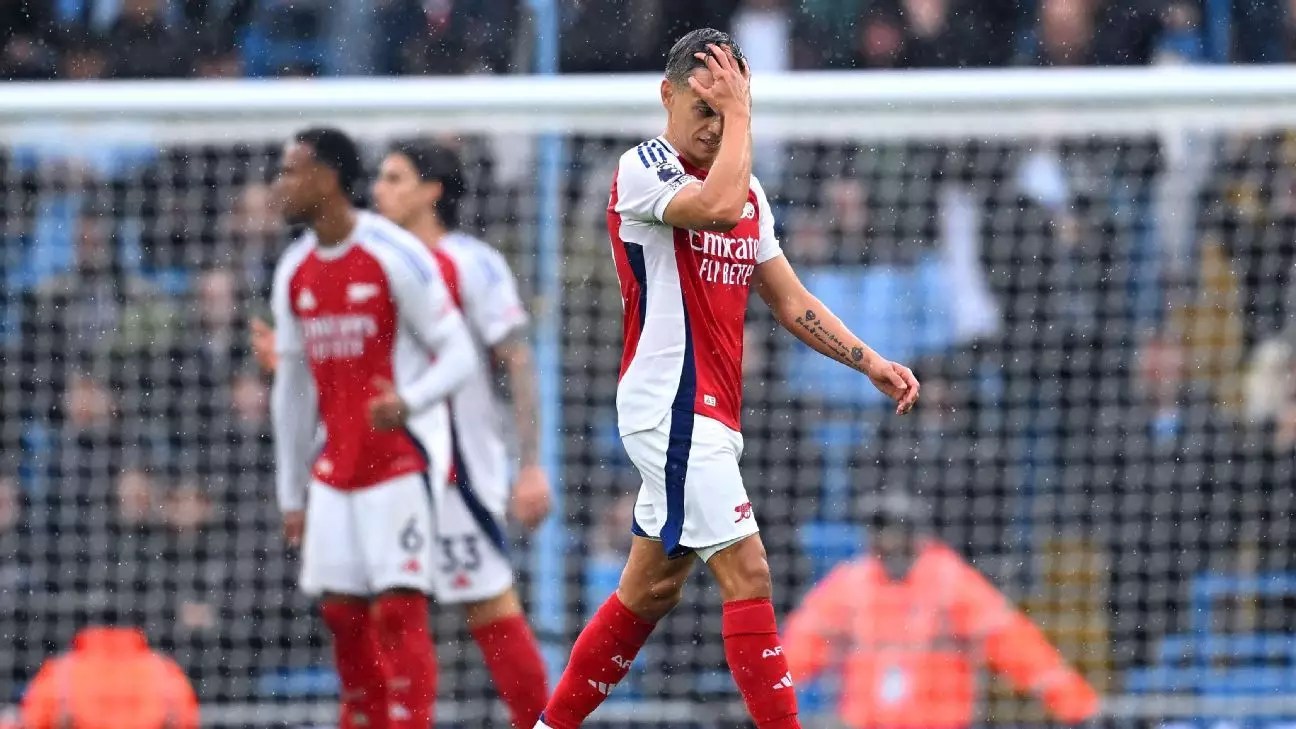The recent encounter between Arsenal and Manchester City sent shockwaves through the football community, not just for the intense action on the pitch but also due to the contentious decisions that unfolded. Arsenal’s manager Mikel Arteta found himself in the spotlight, reflecting on a game that encapsulated both the thrill and the frustration of modern football. After a hard-fought 2-2 draw, Arteta’s observations have sparked discussions about player discipline, officiating, and the relentless nature of Premier League matches.
One of the most pivotal moments of the match was the sending-off of Leandro Trossard, an incident that Arteta highlighted as indicative of broader issues in the league. Trossard’s second yellow card, issued for a late challenge and dissent towards the referee, seemed to shift the momentum entirely. Previously in the 9th minute, Erling Haaland had put City ahead, but after a determined response from Arsenal, including goals from Riccardo Calafiori and Gabriel Magalhães, the team looked well-positioned. However, Trossard’s dismissal on the brink of halftime changed the landscape completely, putting Arsenal at a disadvantage as City ramped up their attacking efforts.
Arteta’s expectations of seeing a high number of send-offs throughout the season underline a growing concern within the league regarding player conduct and the interpretation of rules by match officials. The manager’s prediction of 100 matches featuring sending-offs is a stark warning about the potential volatility in upcoming fixtures, raising questions about the consistency of officiating across the league.
With Arsenal reduced to ten men, Manchester City capitalized on their numerical advantage, showcasing their attacking prowess in the second half. The relentless wave of pressure they exerted resulted in a staggering 20 shots, further emphasizing their dominance in that period. Despite this challenge, Arteta praised the resilience of his squad, highlighting their commitment and determination. He expressed pride in their performance, stating that facing City under such circumstances was no small feat.
The closing moments of the game culminated in John Stones’ last-gasp equalizer, which left Arsenal heartbroken. Although they had battled valiantly, the team’s effort was overshadowed by the cruel twist of fate that led to conceding in the dying minutes. This was not the first time Arsenal had experienced such disappointment in recent weeks, but it reinforced their need for mental fortitude and the importance of finishing strong, regardless of the circumstances.
Arteta’s comments in the post-match interviews also drew attention. His hesitance to directly engage with the officiating decisions highlighted the often fraught relationship between managers and referees. Arteta’s statement, “It’s not my problem to solve what happens off the pitch,” reflected a more significant tension within the sport. While he recognized the necessity of discussing the match itself, he refrained from diving into controversial areas, perhaps aiming to maintain focus on his team’s performance rather than external factors.
This trend of measured communication may become a new standard among managers who find themselves walking a tightrope between critical analysis and diplomacy. The complexities of these public exchanges could influence how such incidents are perceived and discussed by fans and pundits alike.
Despite the mixed emotions that came from the draw with Manchester City, Arsenal sits in a respectable fourth position in the Premier League table. Arteta’s squad is demonstrating growth and competitive spirit, essential elements for a successful campaign. As they navigate the challenges of the ongoing season, the need for consistent decision-making from referees remains vital—not just for the integrity of the competition but also for the mental and emotional well-being of the players and coaching staff involved.
As the season progresses, fans and experts alike will be watching closely. Will further send-offs, controversial officiating decisions, and tactical evolutions shape the Premier League’s narrative? Arsenal’s response to these challenges, alongside their quest for improvement, will undoubtedly define their journey moving forward.


Leave a Reply